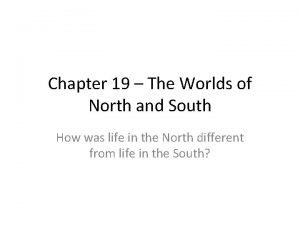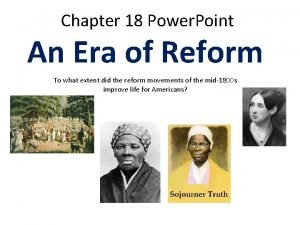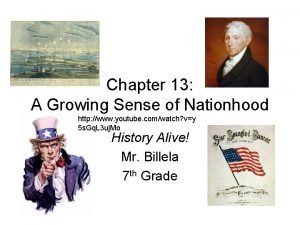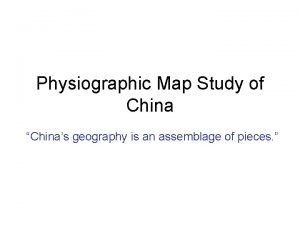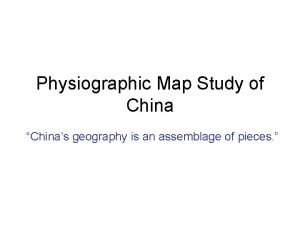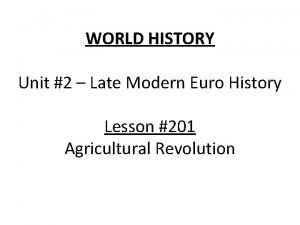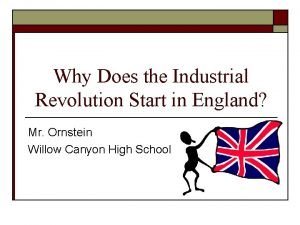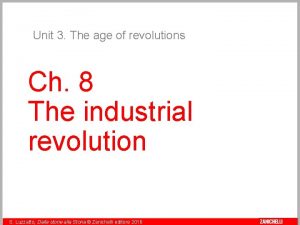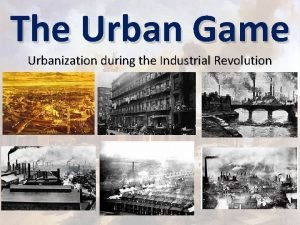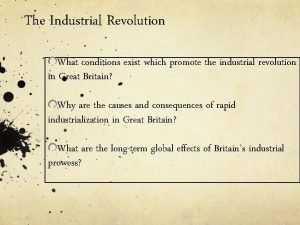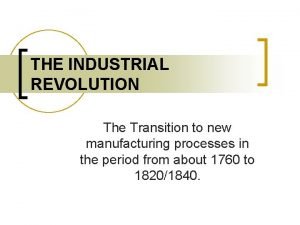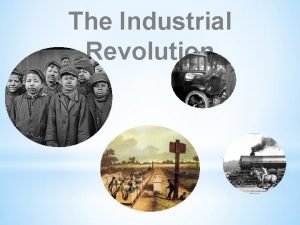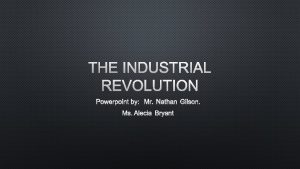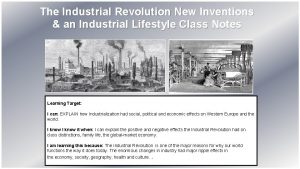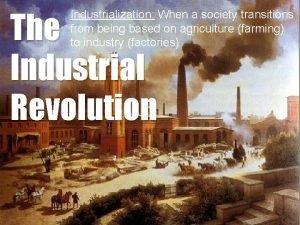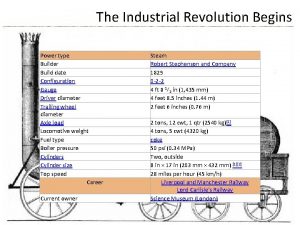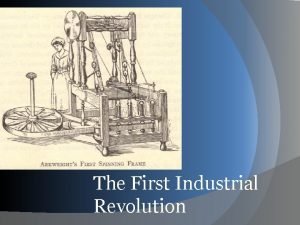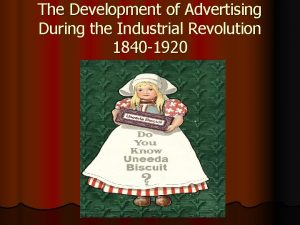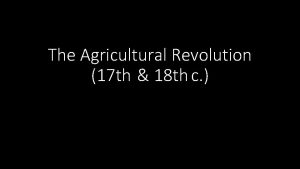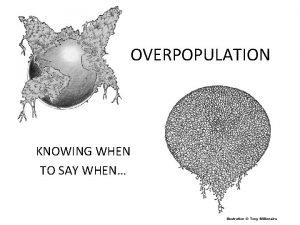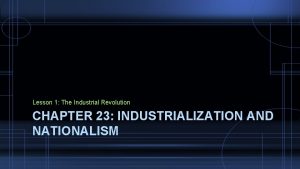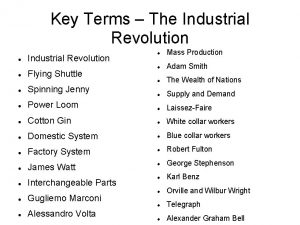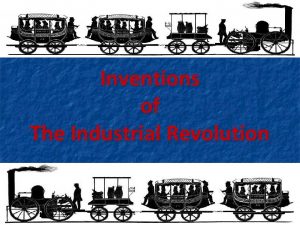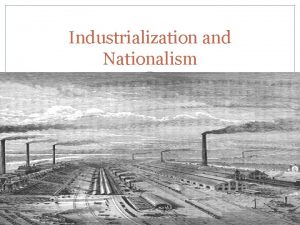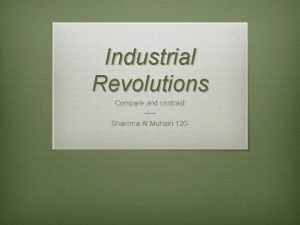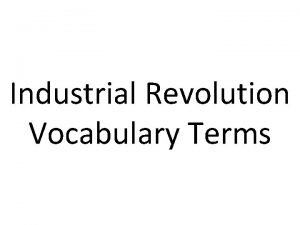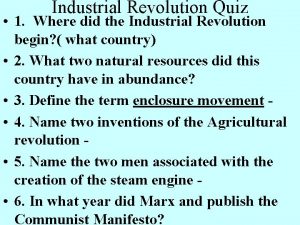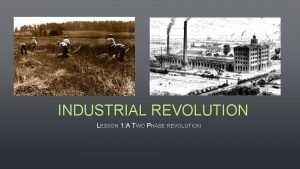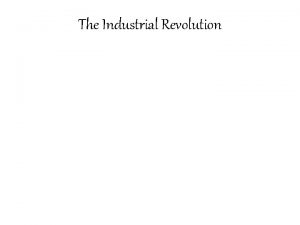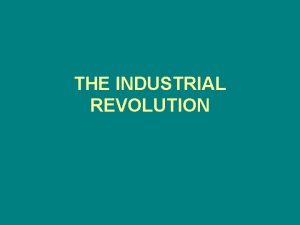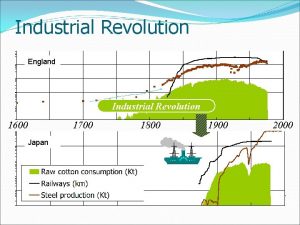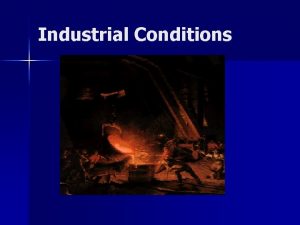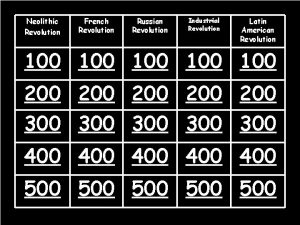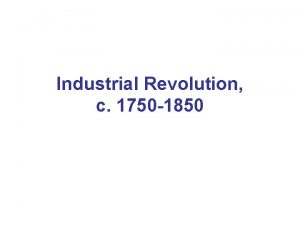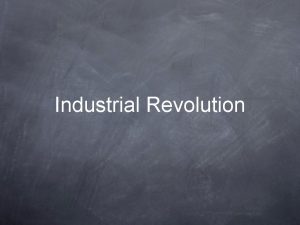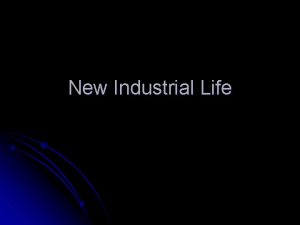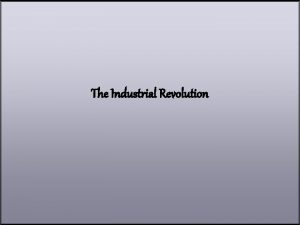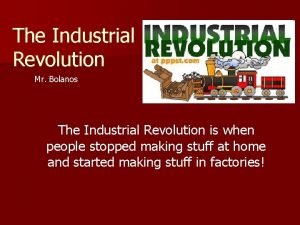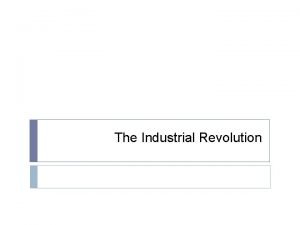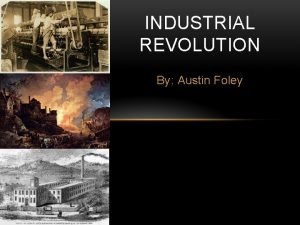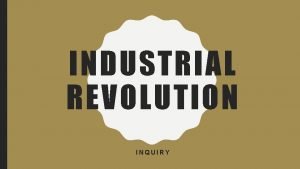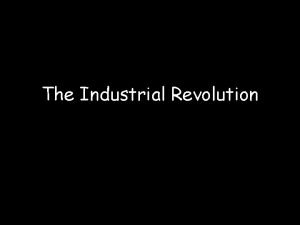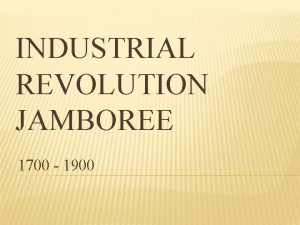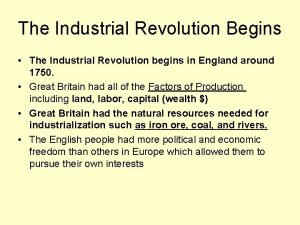Industrial Revolution in England TCI Activity 2 1








































- Slides: 40

Industrial Revolution in England TCI Activity 2. 1

Essential Questions: v Why was England the first country to industrialize? v In order to answer this question, we have to understand what life was like before industrial revolution.


2. 1 A - Traditional or Pre. Industrial Society v Farming in the Middle Ages v Villages feed themselves v One of three Fields left fallow (empty) to regain fertility v Animals grazed in common pastures


2. 1 A - Traditional or Pre. Industrial Society v Disadvantages v Land use inefficient v Farmer’s didn’t experiment with new farming methods v Forces for Change v Population growing – more food needed v French Blockade – no corn- more food needed

Essential Question v How did the new technologies and advancements change the way people lived? v What factors allowed the population to grow?


2. 1 B - The Agricultural Revolution v Enclosure movement v Wealthy landlords fenced in common pastures and experimented with new farming technology v Villages lost common lands and political power, peasants became poorer v Crop rotation v Fields depleted of nutrients by one crop replenished by planting different crops

2. 1 B - The Agricultural Revolution v Other Discoveries v Seed drill planted seeds efficiently v New crops: corn and potato v Results of the Agricultural Revolution v More food available v Population increased

Essential Questions v What is capitalism? v What is the connection between natural resources, entrepreneurship, labor, and capital?


2. 1 C - Cottage Industry and Early Capitalism v Merchant’s role in Cottage Industry v Supplied materials – wool and cotton – to cottages to be carded and spun v Took supplies from spinning cottage to weaving cottage to dying cottage to sell finished cloth v Merchants sell product for more than material and labor = profit + larger investment = higher profit

Spinning Jenny

2. 1 C - Cottage Industry and Early Capitalism v An economic system based on private ownership, free competition, and profit v Cottage industry is an example of early capitalism v Effects of the cottage Industry v Big profits for new class of merchants v Alternative source of income for peasants

Spinning Jenny

Essential Question v How did the new technologies and advancements of industrialization change the way people worked? v How is population growth connected to the growth of cities in the industrial revolution?


2. 1 D – The textile Industry and the Factory System v Textile industry invented v Cottage industry couldn’t keep up with demand for textiles v Spinning jenny, water frame, spinning mule improved spinning v Power loom sped up weaving v Cotton gin separated seeds from cotton


2. 1 D – The textile Industry and the Factory System v Rise of Factory v New Machines, often too big for homes, were put in factories v Factories located near power source: coal, iron, water v Effects of the Textile Factories in Britain v Prices of mass-produced textiles were much lower than hand-produced items v Britain’s Textile industry increased enormously v Majority of villagers forced to leave to find work in urban factories



2. 1 E – Steam Engine: Energy for the Industrial Revolution v The need for Energy v Early factories relied on horses, oxen, and water mills v Steam engine evolved in response to the increasing need for power v How the Steam Engine Works v Steam forced from high to low pressure produces power


2. 1 E – Steam Engine: Energy for the Industrial Revolution v Effects of the Steam Engine v Steam power, used where ever coal existed, increased textile production v Improved mining which increased metals which in turn fueled other industries


2. 1 F – Iron and Coal: Energy for the Industrial Revolution v The need for Iron v Farming tools, new factory machinery, railways v Smelting makes iron more pure, but requires carbon v The need for Coal v Carbon necessary for smelting iron v Steam engines powered by coal

2. 1 F – Iron and Coal: Energy for the Industrial Revolution v Effects of iron and coal v Britain produced more iron than all other countries of the world combined v Coal powered Britain’s enormous navy

Essential Questions v Why was England the first country to industrialize?


The Rocket

2. 1 G - Transportation v The need for better Transportation v Increased production increased the need to transport goods quickly and cheaply v Pre-industrial society used horses, mules, and dirt roads v Inventions v Stone and eventually asphalt roads v Canals v Railroad era rushes in with the Rocket in 1829



2. 1 G - Transportation v Effects of the Railroads v Expanded rapidly throughout Britain v Cheaper transportation increased production and profits v Railways fueled other industries: coal, steam engine, iron, steel, and many manufactured products

Essential Questions v So …. Why was England the first country to industrialize?


2. 1 H – Why Britain Led the Way v Geography v Climate good for textile production v Plenty of natural resources such as iron and coal v Separation from European continent kept them out of wars v Government v Internal trade encouraged v Population allowed to relocate v Helped build canals and roads

2. 1 H – Why Britain Led the Way v Social Factors v British society less rigid than other European countries v Colonial Empire v Supplied raw materials for manufactured goods v Provided market for goods v Advantages of Industrializing first v No other country competing for manufactured goods v Monopoly on technology
 Iescape tci
Iescape tci Chapter 19: the worlds of north and south answer key
Chapter 19: the worlds of north and south answer key Chapter 18 an era of reform
Chapter 18 an era of reform Chapter 13 a growing sense of nationhood
Chapter 13 a growing sense of nationhood Qqqqn
Qqqqn Physiographic map of china
Physiographic map of china Physiographic map of china
Physiographic map of china Tci life in the colonies
Tci life in the colonies Tci chapter 6 answers
Tci chapter 6 answers Tci questionnaire
Tci questionnaire Tci approach
Tci approach Russian revolution vs french revolution
Russian revolution vs french revolution You should hope that this game will be over soon
You should hope that this game will be over soon Green revolution vs third agricultural revolution
Green revolution vs third agricultural revolution Enclosure movement industrial revolution
Enclosure movement industrial revolution Why did the industrial revolution start in britain
Why did the industrial revolution start in britain An age of revolutions zanichelli
An age of revolutions zanichelli Industrial revolution drawing
Industrial revolution drawing Enclosure movement industrial revolution
Enclosure movement industrial revolution Putting-out system
Putting-out system The transition to new manufacturing processes
The transition to new manufacturing processes Industrial revolution quiz
Industrial revolution quiz Nathan gilson
Nathan gilson Industrial revolution positive and negative effects
Industrial revolution positive and negative effects The effects of the industrial revolution meme
The effects of the industrial revolution meme Enclosure movement definition industrial revolution
Enclosure movement definition industrial revolution Water frame significance
Water frame significance Advertising in the industrial revolution
Advertising in the industrial revolution Enclosure movement industrial revolution
Enclosure movement industrial revolution Timeline for the industrial revolution
Timeline for the industrial revolution Thomas malthus overpopulation
Thomas malthus overpopulation Chapter 23 lesson 1 the industrial revolution
Chapter 23 lesson 1 the industrial revolution Flying shuttle industrial revolution
Flying shuttle industrial revolution Who invented the phonograph in the industrial revolution
Who invented the phonograph in the industrial revolution Guided reading activity industrialization and nationalism
Guided reading activity industrialization and nationalism Shamma al muhairi
Shamma al muhairi Industrial revolution vocabulary
Industrial revolution vocabulary Entrepreneurs industrial revolution
Entrepreneurs industrial revolution Consequences of industrial revolution
Consequences of industrial revolution Quiz 1: development of industrial revolution
Quiz 1: development of industrial revolution The industrial revolution lesson 1
The industrial revolution lesson 1

